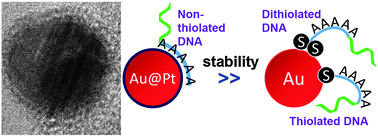A platinum shell for ultraslow ligand exchange: unmodified DNA adsorbing more stably on platinum than thiol and dithiol on gold†
Abstract
Due to the ultraslow ligand exchange rate on Pt, non-thiolated DNA is adsorbed on platinum nanoparticles (PtNPs) more stably than thiolated and even dithiolated DNA on AuNPs. Adsorption kinetics, capacity and stability are systematically compared as a function of DNA sequence. The Pt conjugates can tolerate extreme pH, salt, and thiol molecules. Taking advantage of the optical properties of AuNPs and the extreme stability of DNA on PtNPs, DNA-functionalized Au@Pt NPs are prepared using a cost-effective and more stable bioconjugation method. The DNA-directed assembly of non-thiolated DNA conjugates is also demonstrated.


 Please wait while we load your content...
Please wait while we load your content...